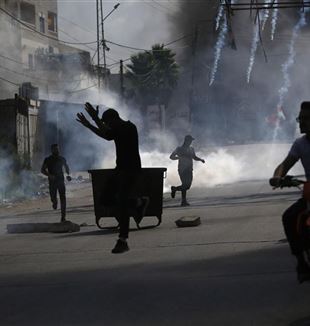
Prosperi: Praying for the Holy Land, this is how we break the spiral of evil
The President of Communion and Liberation:"Concrete and reasonable response to violence and war, we join the invocation for peace launched by Patriarch Pizzaballa."Faced with the escalation of violence, cruelty and death of these days “prayer is the only concrete and reasonable thing, adequate to the seriousness of a situation in which there is no reason for hope based on human capabilities alone. We are convinced that what is impossible for man, is possible for God,” says Davide Prosperi, President of the Fraternity of Communion and Liberation. The movement was among the first to adhere to the invitation of the Latin Patriarch of Jerusalem, Cardinal Pierbattista Pizzaballa, to dedicate the day of Tuesday 17 October to prayer, fasting and abstinence for peace and reconciliation.
Why did Communion and Liberation decide to join the Patriarch’s appeal right away?
Because we share it in both content and method. In regards to the content, we share the judgement that, when there is no glimmer of a solution and no concrete grounds for hope based on human capabilities, the only concrete and reasonable thing is the invocation to God the Father, to the One who can do all things, so that He may look mercifully upon His children and the desire for peace be kindled in hearts. What is impossible to men, is possible to God. Prayer is a very concrete entrustment to God, to whom we entrust the hope that the hostages will be released as soon as possible and that the slaughter of innocent civilians will end.
And in terms of method?
War brings into history the divisions that dwell in the human heart. Prayer, on the other hand, offers itself as a gesture and path to unity. And it reminds us what the condition for building peace is. With initiatives like this one, welcomed and lived out in families, parishes, dioceses, associations, prayer expresses the unity of the people who gather to invoke the action of the Holy Spirit and the intercession of Mary Queen of Peace.
Prayer that promotes unity: is it a feasible path?
We experienced this recently in Milan, with the Dona nobis pacem Walk organised by the diocesan Coordination of Associations, Movements and Groups held on 7 September, culminating in the prayer vigil with Archbishop Mario Delpini, which saw the participation of pastors and faithful from the Patriarchate of Moscow and the Ukrainian Catholic Church of the Byzantine rite.
Dialogue, encounter, unity starting from prayer: how realistic is this path, today, in the Holy Land?
It is possible to ask for and affirm unity, even between peoples, while also recognizing–without naivety–what the causes of this violence are. Among the many geopolitical and sociological arguments we hear today, we must never forget that this is not a war between Israelis and Palestinians. And that Hamas is not Palestine: they are terrorists. In our communities in the Holy Land there are both Israelis and Palestinians. It is not true that encounter is impossible, our experience shows that. We know the thirst for peace and justice that dwells in them. Our Palestinian friends want peace. And they are the first to be terrified of all this.
The current tragic escalation has reopened the eyes of many–even within the Church–to a forgotten conflict and to the suffering of the peoples of the Holy Land...
In CL there is a constant focus on the Holy Land, and for several reasons. First of all we have our communities in Jerusalem and Bethlehem, with which we share what is happening. Secondly, every year we organise pilgrimages to the Holy Land led by CL priests, as our founder, Fr. Luigi Giussani, also did in September 1986. Then there are some Memores Domini involved with the Custody of the Holy Land, and we are collaborating with realities active in the Middle East such as the Association Pro Terra Sancta.
The Patriarch not only asks for prayer, but also for fasting.
Fasting is offering oneself. It is a way of saying to Him who can accomplish what is impossible to us: we make ourselves available. Communion and Liberation adheres to the appeal throughout the world, joining the initiatives promoted in the dioceses or organising them together with other realities of the Catholic laity.
In a secularised society such as ours, how can the path of prayer and fasting be made credible and practicable in the face of the immensity of the violence, oppression, and injustice that seem to have the only and final say in the affairs of peoples?
We are all shocked by the violence and cruelty we hear about, and I certainly share Israel’s right to defend itself. What Pope Francis and Patriarch Pizzaballa are trying to introduce is a new logic, one that can interrupt the spiral of evil, so often humanly inexplicable, whereby it seems impossible to respond to violence and war except with more violence and more war. This is why it is reasonable to follow the path of prayer and fasting: because it helps us to change our gaze, in entrusting ourselves to the One who has shown us a different way. As happened in the person of Jesus, in his teaching, first of all. “Turning the other cheek” is madness for today’s man, but it finds justification in showing with deeds, and not only with words, that there is a gaze on the human being that is charged with the consciousness that the other also has a destiny of good that I cannot dispose of. And then there is the cross. Christ takes upon himself all the evil and all the sin of every person, even today, and with his blood he pays the price for the blood we shed. If Christ has done this, the most reasonable thing today is to entrust to Him all our frailty and inability that He, by His sacrifice, has already redeemed.
Interview published on Avvenire